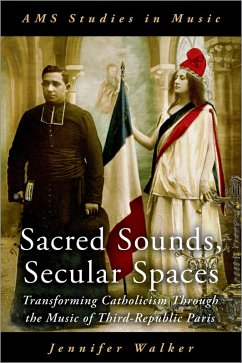Military defeat, political and civil turmoil, and a growing unrest between Catholic traditionalists and increasingly secular Republicans formed the basis of a deep-seated identity crisis in Third Republic France. Beginning in the early 1880s, Republican politicians introduced increasingly secularizing legislation to the parliamentary floor that included, but was not limited to, the secularization of the French educational system. As the divide between Church and State widened on the political stage, more and more composers began writing religious--even liturgical--music for performance in decidedly secular venues, including popular cabaret theaters, prestigious opera houses, and international exhibitions. This trend coincided with Pope Leo XIII's Ralliement politics that encouraged conservative Catholics to "rally" with the Republican government. But the idea of a musical Ralliement has largely gone unquestioned by historians and musicologists alike. Sacred Sounds, Secular Spaces provides the first fundamental reconsideration of music's role in the relationship between the French state and the Catholic Church in the Third Republic. In doing so, the book dismantles the somewhat simplistic epistemological position that emphasizes a sharp division between the Church and the "secular" Republic during this period. Drawing on extensive archival research, critical reception studies, and musical analysis, author Jennifer Walker reveals how composers and critics from often opposing ideological factions undermined the secular/sacred binary through composition and musical performance in an effort to craft a brand of Frenchness that was built on the dual foundations of secular Republicanism and the heritage of the French Catholic Church.
Dieser Download kann aus rechtlichen Gründen nur mit Rechnungsadresse in A, B, BG, CY, CZ, D, DK, EW, E, FIN, F, GR, HR, H, IRL, I, LT, L, LR, M, NL, PL, P, R, S, SLO, SK ausgeliefert werden.

